Blog
Are there enough fridges in developing countries for Pfizer Covid-19 Vaccine?
Sick of hearing about Fridges by Max Lawson - Head of Inequality Policy, Oxfam International
I listen to the World Service news each morning, and I was excited the other day that they said they were going to do a piece on vaccine access in developing countries later in the show. I was pleased as 95% of the coverage of the vaccines issue I have heard seems to completely forget developing countries. Imagine my disappointment when the piece was all about the fact that the Pfizer vaccine needs a super cold refrigerator to be kept without being spoiled, and that distributing the vaccine in developing countries would be hard because they don’t have a ‘super cold-chain’. It was not just the World Service either. Listening to most of the coverage, you would be left thinking that the only thing standing between a citizen of a poor country and the vaccine was the quality of the country’s fridges.
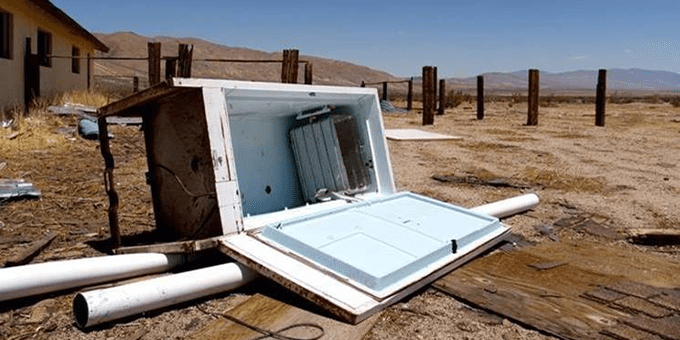
No mention of the fact that rich nations have already bought virtually all the available supply of both Pfizer and Moderna’s vaccine up to the end of 2021. There is literally none for sale to developing countries.
Also no mention of the cost, which is prohibitive for most poor nations. Pfizer’s vaccine costs $40 dollars per person. That is more than the total per capita spending on health in Bangladesh for example. Moderna’s is even more expensive.
I took all of this not just as sign of the terrible quality of today’s journalism, but also as a bit of a personal failure, as we have been campaigning all summer for a People’s Vaccine, focusing on the issues stopping poor people in poor countries accessing a vaccine, but these issues have barely got a hearing so far. Still we must keep fighting.
A broken system for developing medicines for the world.
These first line issues of rich countries buying up supplies and the very high cost have their roots in the underlying model of relying on major pharmaceutical firms to vaccinate the world.
This deeply broken system relies on these huge corporations for global health. It is a system that has consistently failed, prioritising drugs for erectile dysfunction over malaria. Yet rather than use the opportunity of the Coronavirus pandemic to build a better and more rational way of doing things, rich nations have doubled down on this failed approach. As Boris Johnson put it in a recent speech:
‘It isn’t the state that produces the new drugs and therapies we are using. It isn’t the state that will hold the intellectual property of the vaccine, if and when we get one. It was the private sector, with its rational interest in innovation and competition and market share and, yes, sales.’
It is an approach that puts the profit, intellectual property and monopoly of Pharmaceutical corporations ahead of supplying enough cheap and effective vaccines for the world. It is artificially rationing supply, and this in turn will cost lives.
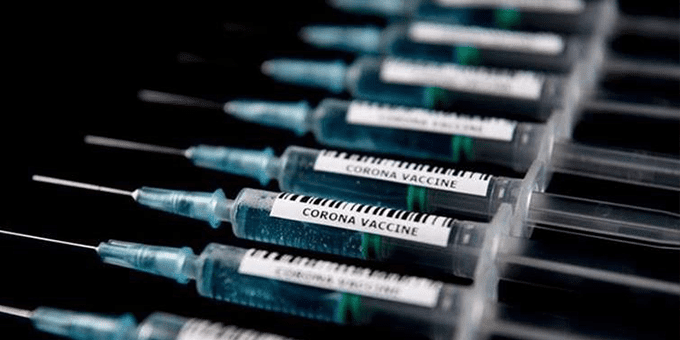
It is fact the case than none of these leading vaccines would exist without the state. The leading vaccine candidates have received billions already in taxpayer’s money. Moderna received billions in US government funding. Pfizer claims it did not, ignoring the uncomfortable fact that its partner, a German firm called BioNTech received hundreds of millions of euro in government funding. It was also BioNtech that invented the vaccine in the first place. Pfizer are effectively just middlemen yet stand to make an absolute fortune with a profit margin of up to 80%.
As the vaccine is rolled out in the UK, US and other rich nations, the world is getting to see what a rational distribution of the vaccine should look like. No doubt some of the richest people in these countries will find a way to get the vaccine whatever happens. Nevertheless, most vaccinations are going to happen in an orderly and rational way, prioritising groups like health workers and the elderly first.
This stands in stark contrast to the way that vaccines are going to be distributed globally. There is actually a WHO led equitable allocation framework, which would see every country having enough vaccines to vaccinate its key workers and other vulnerable groups first. Which makes sense both in terms of global health and in terms of the global economy. Yet sadly this is being completely ignored as rich nations rush to stockpile enough vaccine to vaccinate every single one of their citizens many times over. Meanwhile many poor nations have virtually no access at all. If ever there was a need for a world government, it is now.
Yet back in the world of naked national self-interest, it is hard to blame the leaders of rich nations for wanting to ensure their citizens are safe. That is their job after all. It is a brave political leader who tells a voter in Manchester they must wait to be vaccinated until a health worker in Mali gets the jab. Finding a way to rationally divide up the finite supply was always going to be an uphill struggle.
Rich nations not doing enough to maximise the supply of vaccines
But what I do blame rich country governments for is failing to do everything in their power to instead maximise the supply of cheap, safe and effective vaccines. They have immense leverage over these vaccine producers. The huge public money they have given. The guarantees of purchase, where as bulk purchasers they have huge power. The fact that these firms are based in their countries. All of this leverage and more could have been used to break through the ossified system of secrecy, profit and patent and flood the world with safe and effective vaccines.
The Oxford/ AstraZeneca deal is being contrasted rightly with Pfizer and Moderna. Oxford and AZ have done the majority of their supply deals with developing countries and are producing billions of doses. Their vaccine is far cheaper. There is absolutely no doubt that this deal is vital for most of the world and is the best of the lot so far.
But even this deal is far from ideal. It is still secret. It is still an exclusive license from Oxford University to Astra Zeneca, despite one of the two inventors of the vaccine Adrian Hill commenting early on that: “I personally don’t believe that in a time of pandemic there should be exclusive licenses…. Nobody is going to make a lot of money off this”. Soon after this an exclusive license was exactly what happened, in a rather grubby struggle between academics within Oxford University and involving the Gates Foundation and the UK government. AstraZeneca eventually secured the exclusive deal by promising to help fund a new research institute at the university, and Oxford is set to potentially make a profit of $100 million dollars.
The deal was nevertheless a good one- low ‘not for profit’ prices had to be guaranteed by AZ for some developing countries in perpetuity and for the rest of the world ‘during the pandemic’ (although documents leaked to the Financial Times showed that AZ reserved the right to define when the pandemic finishes, and this could be as early as next summer).
Maybe this was the best deal that could be secured. Maybe it was not. We will never know probably as it is all clouded in secrecy, despite huge public funding. Either way it means most of the world is largely reliant on one company. A company that unlike Pfizer and Moderna, actually saw its share price fall following the announcement of its successful results in November. Markets are punishing Astra Zeneca for having the least profitable of the three deals.
This shows the limits of expecting individual companies to act better. In some ways expecting big Pharma to invest in vaccinating poor people in poor countries is like asking a wolf to be vegetarian. Arguably they are doing exactly what they are supposed to do, make money. Often unethically, rapaciously and excessively. Sometimes corruptly and illegally. But their core business is to make money and that is never going to change.
So whilst a far more regulated and policed pharma sector is essential, I think this can only ever be part of the problem of designing and delivering cheap safe and effective vaccines and medicines for all. To do this we need to go beyond market-based solutions to this fundamental human need. Health is a public good, which underpins everything, not least a functioning market economy. Leaving our health to the vagaries of the market can have an astronomical cost for the rest of the economy. The last few months has demonstrated this clearly. Health is simply too important a human need to be left to the market.
What is needed instead is a new strategy, based on the public good. So far this race for a vaccine has shown us the best of humanity, and sadly the worst too. What is needed now is imagination and ambition to build a new and permanent change in the way we develop medicines and vaccines. I think that we need to imagine a far more public system, from the research and development all the way through to the nurse giving you our injection.
The fight for a People’s Vaccine
For the moment such decisive leadership looks sadly unlikely. But we could still see important moves by rich nations and others in the coming months that could make a huge difference. Over a hundred leaders wrote to Joe Biden this week, calling on him to support a People’s Vaccine. He is uniquely placed to put leverage on the majority of the leading vaccine candidates.

Nearly a million people have signed Avaaz’s petition for rich nations to support a waiver on all intellectual property relating to Covid-19 medicines. This proposal has been made jointly by the governments of India and South Africa, and is so far vehemently opposed by the US, EU and UK. The Chinese and the Russian governments have developed successful vaccines and are doing supply deals with countries all over the world, in contrast to rich nations who are only focused on their own.
As the next few months unfold, the world will watch as rich nations vaccinate their populations and beat this disease. At the same time, many, many people will continue to die in developing countries for want of a vaccine. This will put huge moral pressure on the leaders of these rich nations to do more. If we can successfully show the world that rich nations are choosing to put Pharma profit ahead of vaccinating the world, perhaps they will be forced to act. It is certainly something worth fighting for.
Youth Challenge Vanuatu launches E-learning pilot to support youth during disasters and beyond
It is a familiar conundrum around the world during the coronavirus pandemic – students crammed into home offices or at the kitchen table, adapting to the strange new reality of learning online and communicating with classmates and teachers solely through a screen.
For many young students in Vanuatu, getting an education online is an unfeasible or unaffordable luxury. But with the help of generous donors, Upskill People and Digicel, and supported by Oxfam, Youth Challenge Vanuatu (YCV) is helping young people in the island country to take their learning online.
The pilot programme, launched in May, provided students with free mobile data, access to computers at the training centre, and free online courses. The aim of the pilot was to find ways to improve flexibility and accessibility for young people wanting to gain new skills and knowledge. This will be especially useful in the aftermath of a natural disaster, when classroom learning is not an option.

Upskill People, a UK-based company who create and deliver online learning courses for businesses and individuals, were fundamental in the experiment. For the pilot they provided free access to five courses from their library, all of which had online quizzes. Courses included food sales and service, food hygiene, and understanding depression. With this generous donation, Youth Challenge Vanuatu and its pilot students could identify challenges and opportunities for making more online learning available from people’s phones or home computers in the future.
In total, 47 students participated in the first pilot programme delivered by Youth Challenge Vanuatu. Selected students were given free access to online training resources for an eight-week trial period. They could then log in to their personal Upskill People online account and study anytime, anywhere and on any device. Digicel’s contribution of free internet data meant the students could stream online videos and other training content from their personal phones or tablets.

Youth Challenge Vanuatu student Glenda Mass uses the e-learning platform from Upskill. Photo: Lillyrose Welwel / Youth Challenge Vanuatu
Data from the pilot showed it was a great success:
· 100% said they learned skills they could use
· 96% found the course easy to use
· 100% said the enjoyed learning in this way
It is clear there is a lot of potential in this new approach for YCV. The organisation currently provides a suite of courses and assistance for job-seeking, employment and life skills, and entrepreneurship to disadvantaged youth, with life-changing results. By using a well-curated menu of online resources, more students can access training, with more flexibility via a mix of taught and self-paced options, and students can take greater control of their own learning pace. Armed with the learnings of this initial pilot, YCV is moving forward in the hope that more ni-Vanuatu youth will soon be able to sign up for further online learning journeys.
Oxfam has been working with YCV for over ten years to improve access to life-changing training and courses for Vanuatu youth. This pilot took place as part of a five-year project to lift the quality of YCV’s training and mentoring and the sustainability of this unique organisation, funded by Oxfam and the New Zealand Aid Programme.
The Carbon Inequality Era
in 1990, we entered a new global era.
From 1990 until 2015, as much carbon entered our atmosphere as had been emitted in all previous years in our history.
Our new report, Confronting Carbon Inequality, shows that responsibility for this rapid emissions rise is shockingly unequal. In this period, the richest 10% emitted
the same amount of carbon as the rest of the world combined.
And the very richest 1% of people – the global elite – emitted double the amount of carbon as the poorest 50% of humanity.
This is the era of extreme carbon inequality.
Who are the richest 10%?
If your net income is over USD$38,000 annually, the chances are you’re one of the richest 10% of people in the world. (Find how much that is in your currency here.)
That 10% – around 630 million people at the time of the study – live in every continent, and there are wealthy communities in every country. A sizeable proportion of the population in North America and Europe sit comfortably in this demographic. By contrast, in most parts of Africa, Asia, and Latin America, the number of people on the global 10% rich list is tiny.
The emissions of the richest largely come from flying more, buying more polluting cars such as SUVs, and driving them further. These are often known as ‘lifestyle’ emissions.
Additionally, many of the emissions we all produce are ‘embedded’ – this means that they are happening because we live in a world that still relies on fossil fuels. In
cooler climates, people need to heat their homes, for example, and gas is still the most accessible option. Many of us can make climate-conscious choices when
it comes to the food we eat, the clothes and tech we buy – but all come with some carbon cost in this system.
So as well as individual action, we need radical, far-reaching change to the system if we are to truly confront carbon inequality.
Why now?
Time is short. There is a limit to the total amount of carbon that can be pumped into the atmosphere. Breaching this limit – the so-called ‘carbon budget’ – will trigger runaway global heating, that we can no longer control or remedy. Think of it like filling a bath – there is still some space left before we reach the top, but if we don’t turn off the taps now, it’s going to overflow.
Over the last decades, this remaining ‘space’ in the atmosphere could have been used to lift all of humanity out of poverty, towards a decent standard of living. Adding some carbon emissions by connecting people to the electricity grid while we’re still transitioning to renewables, for example.
Instead, the carbon budget has been spent by the already-rich on luxury emissions. If we continue as we are, we will blow the carbon budget in the next ten years. Carbon inequality is driving us towards climate catastrophe.
So, what do we do now?
Back to the bath analogy – just as every drop of water increases the risk of an overflow, every ton of carbon counts in moving us towards the climate brink.
As every ton counts, there is hope if we all play a role individually and collectively. COVID-19 showed us – painfully, and unjustly, but decisively nonetheless – that huge changes are possible when necessary. Flights were grounded, new bike lanes appeared in cities, and homeworking cut traffic congestion. Governments and
businesses showed they can be radical when there is no other choice.
As we turn towards recovery from the pandemic, governments must act to cut the emissions of the richest and increase support to the poorest. Four ways to do this are:
- Tax the richest more, to help curb spiralling inequality.
- Introduce an added cost to luxury emissions such as multiple flights and SUVs. Use the extra cash to fund universal social protection, health and care.
- Invest more in low-carbon projects like public transport and energy efficiency, and guarantee decent jobs.
- Ban advertising in public spaces, especially for high-carbon luxury products.
Looking at the big picture, we must profoundly change the way we measure economic success. Let’s learn from the past decades and prioritize care, the sustainability of life, health, and wellbeing, instead of pursuing endless economic growth.
2020 must mark the end of the carbon inequality era. How we shape the next decades – the post-COVID era – is up to us.
Join our community of #EarthProtectors and play your part in confronting carbon inequality: https://www.oxfam.org.nz/what-we-do/campaigns/climate-justice/
Pandemic Exposes the Obscenity of our Economy: 3 Ways We Got Here and 4 Ways We Can Get Back on Track
Released today, Oxfam’s report – Power, Profits and the Pandemic – reveals how global corporate behaviour has not only made the economic impacts of the coronavirus pandemic worse, but has also shielded many of these corporations from the economic fallout felt by the rest of us. Throughout the disaster, they have continued to profit and pass these gains on to their mostly wealthy shareholders.
Oxfam found that 32 of the world’s most profitable corporations are together expected to rake in nearly NZ$165 billion more in 2020 than the average of the four previous years. These corporations are household names including Visa, Procter & Gamble, Nestle, Johnson & Johnson, Facebook, Google, Microsoft, and Apple.
This isn’t right. How have we managed to build a global economy that puts more and more wealth in the control of a handful of people, while billions of other people suffer? As of this writing, more than 800,000 people have died from Covid-19. Approximately 400 million people, mostly women, have lost their jobs, which impacts entire families. Some estimates have up to 500 million people being pushed into extreme poverty while the pandemic rages on. Meanwhile, the 25 wealthiest billionaires – some of the largest shareholders in the above-mentioned corporations – have increased their wealth by a staggering NZ$340 billion between mid-March and late-May alone.
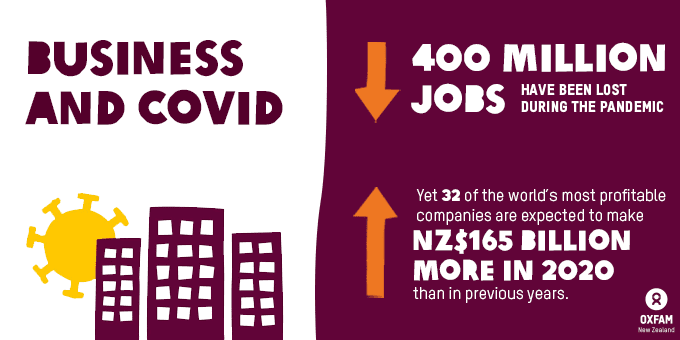
How did we get here?
1) Corporations made trillions for the few, almost nothing for the many.
Between 2010 and 2019, the companies listed on the S&P 500 Index paid a total of NZ$13.7 trillion to their shareholders – approximately 90% of their profits over that time. While these corporations could have been investing in the well-being of their workers and climate-friendly technologies, they were channelling the vast majority of their profits back into the hands of a small number of already wealthy individuals. If they had been investing more in their businesses, they would have been more resilient in the face of this crisis. They would have had cash on hand to protect their workers, prevent lay-offs, and avoid costly public bail-outs when the coronavirus pandemic hit.
2) Governments have helped, corporations have not.
The pandemic has highlighted the crucial role our governments play in providing for all people, especially in times of crisis. Yet, many of the largest global corporations have done very little to help. They stand to make NZ$165 billion more during 2020 than in the past four years, and some of their largest shareholders increased their collective wealth by an unfathomable NZ$340 billion during the height of the pandemic. Despite this windfall, these companies’ donations to Covid-19 relief have amounted to less than 0.5% of their 2019 profits. In stark contrast, 94% of their 2020 profits have gone back to their already wealthy shareholders.
3) Corporations prioritised their profits over their own people.
Oxfam has found that more than 400 corporations have continued to make shareholder pay-outs and executive compensation despite laying-off workers and receiving government bail-outs. These companies have shifted costs and risks down their supply chains, impacting workers in vulnerable situations.
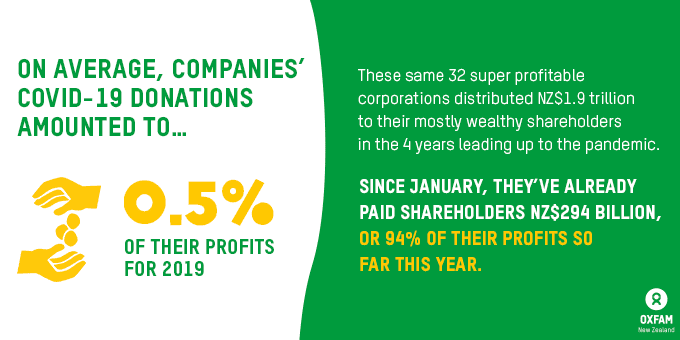
This situation is not right
It is the result of a broken economy that works for the few, not the many and puts the wealth of a small number of people before the well-being of our planet and billions of people across the world. But we created this economy — we can fix it. We can reprogramme the economy to put people and the planet at the centre, protect workers in the most vulnerable situations, share profits fairly, and ground it in democracy. The way to do this is by focusing on the four Ps: purpose, people, profits and power.
1) Purpose
We should re-examine the purpose of corporations. A corporation’s ‘reason for existence’ is a policy choice, not an inevitability. Corporations should be redefined to ensure that they exist not only to compensate shareholders, but also to care for workers, consumers, and their communities. The objectives of corporations and director’s duties should include non-financial aims, such as improving social and environmental conditions.
2) People
We should put people at the centre of business models, and insist that corporations invest in decent jobs, protect and promote their workers’ human rights, and address human rights risks, and support efforts for universal social protection.
3) Profits
We should ensure that all stakeholders get a fair share of the profits that corporations create. For example, dividends paid out to shareholders should be capped, and only paid out after corporations are paying a living wage to all their workers and investing in achieving carbon neutrality. These measures should also be extended through corporations’ supply chains, which could have a massive impact on people across the entire world.
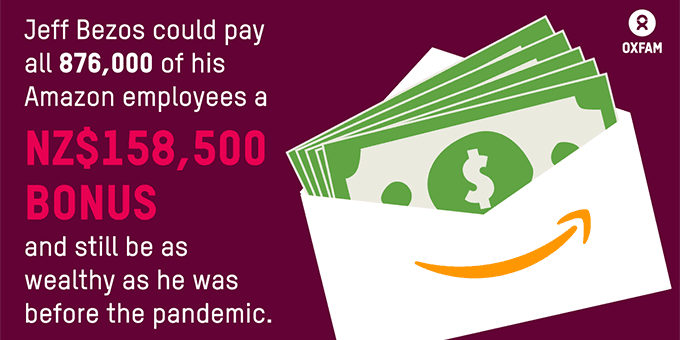
4) Power
We should change the rules that currently allow global corporations and their shareholders to have vast amounts of power to protect their own interests. This is possible through increased transparency, and more inclusive and equitable governance structures. Governments should require corporations to limit CEO-to-worker wage gaps, disclose human rights risks, enforce human rights due diligence, and publish corporate carbon footprints. Collective bargaining and robust grievance mechanisms should be enforced. And corporations should prioritise suppliers that give greater voice, power and value to workers and farmers.
We can fix this
As a first step, we propose a World War II-style Covid-19 Pandemic Profits Tax to make sure these corporations do their bit to help us all during this global disaster. Oxfam estimates that the excess profits of these 32 global corporations could raise an estimated NZ$157 billion — enough to pay for Covid-19 testing and vaccines for every single individual on the planet. After that, there would still be plenty left over to invest in supporting small and medium-sized enterprises, protecting workers, and providing robust health services for all.
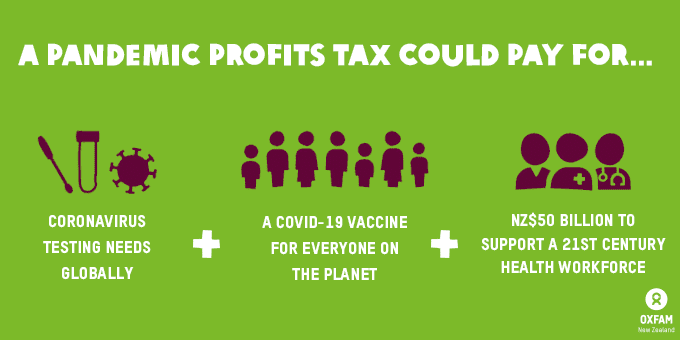
The coronavirus pandemic has shown us how connected we are as a global human family. Global corporations have grown and benefitted from these connections for centuries, but they have not contributed to the global public good in the way that they should. In fact, in many cases, they have done harm. The excess profits the largest corporations are making through a time of great suffering for millions of people across the world exposes the obscenity of the way our global economy has been built. We need to fix this now so that all people, everywhere, can enjoy the basic dignities of life, on a planet that thrives.
To read the report in full click here
World Humanitarian Day 2020: Celebrating Yemen’s Local Heroes in the Midst of Crisis
This World Humanitarian Day, Oxfam pays tribute to all humanitarians, like these three extraordinary people in Yemen, who are working to ensure that their community and their country can one day thrive.
For people in Yemen, like people across the globe, 2020 has been a year like no other. Over five years into a conflict that has killed thousands and uprooted millions from their homes, the COVID-19 pandemic has added yet another layer to the country’s ongoing crisis. Health services – already operating at half their pre-war capacity – have been overwhelmed, and people’s fear of COVID-19 may be preventing them for seeking healthcare, potentially masking a deadly cholera outbreak. On top of this, the economy is collapsing; remittances have fallen dramatically due to recession and job losses in other parts of the world. Meanwhile, over halfway through the year less than a quarter of the money needed for the humanitarian response has so far been given.
Yet in the midst of these layers of crisis, are the many extraordinary Yemenis who are standing with their communities to help in any way they can. Wherever any crisis hits, it is local people and communities who are on the frontlines of the response, and Yemen is no exception. We spoke with three of these local heroes: Abeer, Asem and Heba. Despite the impact that COVID-19 has had on all of their lives – from Asem, who has had to put his medical degree on hold, to Heba, who worries every day that her nine-month-old baby will fall sick with the virus – they continue to work to provide assistance to those who are worse off than themselves, and prevent the further spread of the virus. This World Humanitarian Day, Oxfam in Yemen pays tribute to all humanitarians who, like them, are working to ensure that their country can one day thrive.

Heba: “We are humanitarians… if we don’t stay to help people, who will?”
Heba works as a Public Health Promotion Officer for Oxfam in her hometown of Aden, southern Yemen. Her job – which involves raising awareness around the importance of good hygiene, and training community health volunteers to deliver hygiene awareness sessions – has put her on the frontlines of the COVID-19 response in Yemen. Throughout the four years that Heba has worked for Oxfam in Yemen, she has seen the impact of diseases such as cholera, dengue and polio. But the COVID-19 response has been a challenge unlike any other:
“It’s been difficult – we try to avoid meeting with our colleagues, and we’ve been really careful about going out to speak with the community. So much of our work is normally done face-to-face, but we’ve had to find other ways of making sure that communities are aware of what they can do to prevent the spread of COVID-19 [such as phoning people up or visiting individuals so that we don’t gather in large groups]. As a mother and wife, I was also concerned for the health of my family, and my nine-month-old baby; this is a disease that could affect anyone.”
Despite her worries, however, Heba told us that she believes the work she does to be more important than ever:
“I am proud to be part of Oxfam and have the opportunity to contribute to supporting people in my country. We are humanitarians. We are needed more than ever in times like these; if we don’t stay to help and support people, who will?”

Asem: “COVID-19 turned our lives upside down”
Asem is a community health volunteer (CHV) for Oxfam in a village in Al-Dhale, southern Yemen, where his family lives. He joined Oxfam’s growing team of CHVs in May this year, going door-to-door and holding group sessions in order to raise awareness within his community around good hygiene practice, so that people can protect themselves from disease.
Asem, a first year medical student, was visiting his family from Morocco – where he had received a scholarship to study – when the pandemic struck. Travel restrictions meant that he couldn’t return to university, so he decided to volunteer with Oxfam:
“COVID-19 turned our lives upside down. I was worried and frightened in the beginning – I felt so helpless. But then I started volunteering with Oxfam to raise people’s awareness about COVID-19, and how to protect themselves. We make sure that the awareness sessions all respect physical distancing, of course – over time, good hygiene practice has become part of our routine.”
According to Asem, one of the biggest challenges in Yemen is asking people to stay inside where possible to avoid spreading COVID-19. In a country where working from home is not a realistic option for most, people need to go out to work in order to be able to afford food for their families.
“I chose to volunteer with Oxfam because I wanted to help people in my village to protect themselves from diseases. Despite the risks and challenges, I think it’s important that people are raising awareness – and as a young person I feel like it’s my responsibility to protect others.”

Abeer: “It’s a really difficult feeling when you see so many people in need and you know that the help available just isn’t enough.”
Abeer, originally from the Yemeni capital Sana’a, works as a Public Health Officer in Hajjah. This area in northern Yemen has been hard hit by conflict and hosts a large population of displaced people, the majority of whom are women and children, living in crowded camps where social distancing is often impossible, and access to clean water and hygiene products is inadequate.
She told us how the arrival of COVID-19 has added to the daily challenges of humanitarian workers in Yemen:
“There were already thousands of families living in terrible conditions in the camps for displaced people in Hajjah. With the arrival of coronavirus, the situation became even worse. It’s a really difficult feeling when you see so many people in need of assistance and you know that the help available just isn’t enough. And, with the drop in funding, instead of increasing to match the rising need we have had to cut some of our projects. That’s been the most difficult for me throughout this pandemic. It’s a terrible feeling.”
Yet, despite the challenges, Abeer continues to see the difference that her work makes for those who have already lost so much:
“My job gives me the opportunity to make a tangible change to my country. The most rewarding part of it is seeing the smiles on the faces of the people we help – we’re saving lives through providing people with food, shelter, clean water, and soap. Over the past five years, we’ve worked to help people whose homes have been totally destroyed by war.”
Since the confirmation of cases of coronavirus in Yemen in April, Oxfam has refocused its work to respond to the pandemic. We are working on rehabilitating water supplies, distributing hygiene kits for the most vulnerable households, and trucking in clean water to camps for people who have had to flee their homes. We have also given cash for food to families affected by flooding. Across Yemen, we’re training community health volunteers to spread the word about coronavirus and the importance of hygiene and hand washing.
By Ahmed Al Fadeel, Omar Algunaid, and Hannah Cooper
- « Go to Previous Page
- Page 1
- Page 2
- Page 3
- Page 4
- Interim pages omitted …
- Page 22
- Go to Next Page »





